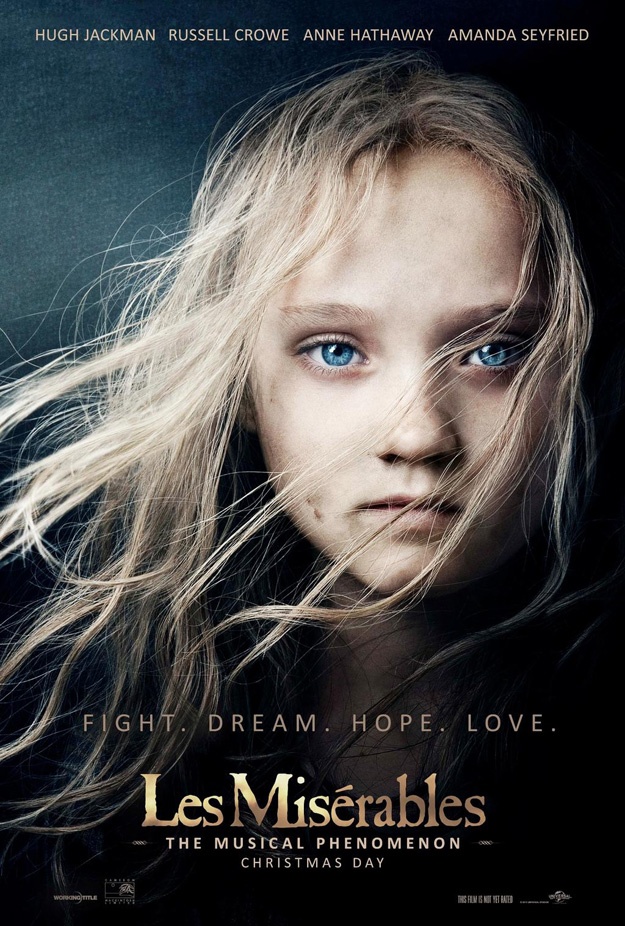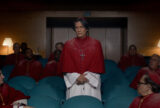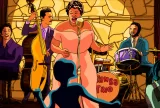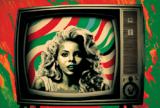11.26.2012 | By Jack Rico |


‘Argo’ beware. ‘Les Misérables’ is now the the favorite to win Best Picture at the 2013 Oscar Awards. Director Tom Hooper has created a cinematic masterpiece drenched in powerful performances, both acting and singing, a stunning cinematography, memorable camerawork and a haunting score sure to provoke tears of joy and sadness.
Based on what is widely considered to be one of the greatest novels of the nineteenth century, and the world’s longest-running theatrical musical, Victor Hugo’s French book ‘Les Misérables,’ first published in 1862, is set against the backdrop of 19th-century France. It’s the enthralling story of broken dreams and unrequited love, passion, sacrifice and redemption – a timeless testament to the survival of the human spirit. Hugh Jackman plays ex-prisoner Jean Valjean, hunted for decades by the ruthless policeman Javert (Russell Crowe) after he breaks parole. When Valjean agrees to care for factory worker Fantine’s (Anne Hathaway) young daughter, Cosette (Amanda Seyfried), their lives change forever.
I speak for many when I say, a great deal of people did not expect this film to be the masterpiece it is, nor to overshadow ‘Argo’s’ acclaimed and hyped campaign. ‘Argo’ had such a fantastic operation going on that it needed a titanic tour-de-force to derail it… and ‘Les Misérables’ did exactly just that.
Principally, what makes this movie so extraordinary, in this particular year, is the presentation of so much emotional heft on screen for such a prolonged time. No other movie, with the exception of Spaniard director Juan Antonio Bayona’s ‘The Impossible,’ can manhandle your emotions as forcefully. When you add the majestic scale of the production and the stylish cinematography, it truly becomes a sensorial experience.
After his 2011 Best Picture Oscar film, ‘The King’s Speech,’ director Tom Hooper has managed to elevate his filmmaking craft to another level. Perhaps his biggest impact to the film, and ultimately his legacy to modern filmmaking, was his decision to have the vocals from the actors sung live on set as opposed to lip-synch playback. This technique allowed the actors to change inflections and include impromptu emotions into their roles. Hooper also utilized many close-ups to capture and play up the affecting singing scenes of the lead actors. But what brought everything to life was the cinematography from Danny Cohen. The vivid color hues of red and blues were just icing on the cake on what is a beautiful looking film. It truly is blissful to watch.
When you think of the central characters on a film, one usually thinks of the actors, but in this particular film – a musical – the songs and score were the protagonists. The actors themselves were only the vehicles to Alain Boublil, Claude-Michel Schönberg and Herbert Kretzmer’s magical lyrics, music and libretto, which literally permeates every single frame. If you’re a thespian that can act and sing well, this is the role of a lifetime. Some of the most rousing and indelible scenes happen early in the film, as Jackman and Hathaway transcend the performances of “What Have I Done?” and “I Dreamed a Dream”, respectively. They sung it with so much pain and affliction, that it is hard to not be moved to tears by them. Expect both to be recognized with nominations, and even wins in the Best Actor and Supporting Actress categories throughout the award circuit. Overall, the music is as mellifluous and euphonious as you can get and the vocal performances by many of the leads are heart-wrenching and haunting.
This is not to say that everyone sounded as beautifully as Samantha Barks did in “On My Own”. There were misses such as Russell Crowe in the role of Javert, the villain and antagonist of Jean Valjean. His unmelodious singing and monotonous tone could have almost wrecked this work of art. I also wasn’t praising Eddie Redmayne as Marius. Nice kid, just thought Hooper could have done better. Moreover, a must know before seeing this film is that there is no dialogue. The words are sung for the entirety of the movie. This can be vexing to many who are not used to it, like myself when I experienced on Broadway the very first time. It’s an acquired taste and not for everyone.
Compared to the other contemporary musicals (Evita, Chicago, Nine, Phantom of the Opera, etc), ‘Les Misérables’ is in a league of its own. You could say it is the best modern movie musical done so far. It is also the best movie of 2012. Nothing else rivals its combination of acting, music, direction and storytelling. Not ‘Argo,’ not ‘Lincoln,’ and definitely not ‘Silver Linings Playbook,’ which is now out of the race, even if Harvey Weinstein is involved. ‘Les Misérables’ isn’t for everyone because it uses an unconventional storytelling method that the normal moviegoer might be averse to. But if you can put your personal tastes to the side, you will be introduced to a new experience that will move you like you haven’t been before. The music stays with you to the very end and the performances linger in the crevices of your mind and heart. ‘Les Misérables’ is, without a doubt, an experience you will cherish for years.
Rated: PG-13 for suggestive and sexual material, violence and thematic elements
Release Date: 2012-12-25
Screenplay: William Nicholson, Alain Boublil and Claude-Michel Schönberg, Herbert Kretzmer
Official Website: http://www.facebook.com/LesMisMovie




























